The eDost women-first digital village catalyst model piloted in the remote tribal areas of Maharashtra offers huge scope for replication across several locations that face a dearth of digital services. In this Good Practice note, Mr Ramaprasad V and Ms Pooja Majgankar from BAIF share the experience deriving from this initiative.
CONTEXT
Smartphone usage and internet penetration are at an all-time high in rural areas of India. The COVID-19 pandemic has compelled all citizens to go digital for education, banking services, governance, and commerce using mobile phones. But rural people/farmers have limited awareness on how to avail of these services through mobile phones, they mostly use mobiles only for communication and entertainment purposes. The digital literacy status of rural people and lack of supply chains also added to this state of affairs. The situation also compelled rural youth, especially women, to find jobs near to their communities, which was challenging. BAIF (Box 1) noticed and addressed these twin problems of lack of digital services and frictional unemployment of educated rural youth/women through their innovative digital initiatives such as eDost (Fig 1).
| Box 1: BAIF Development Research Foundation BAIF Development Research Foundation is a non-profit organisation established in 1967, operating in 318 districts across 13 states in India. BAIF has worked with more than five million farmers in more than 100,000 villages through its 6000+ member team. Its main focus is on empowering people through sustainable rural and tribal livelihoods. The main domain areas of BAIF are livestock development, tree-based farming, and natural resource management. Apart from these areas, BAIF works on applied research for development on livestock and crops, interdisciplinary areas and emerging technology-based initiatives, including information and communications technology- (ICT) led interventions. BAIF works on other cross-cutting themes such as climate resilience, biodiversity conservation, community health, gender concerns, value chain development and enterprise promotion. (BAIF: https://baif.org.in/) |
eDOST – A BOUQUET OF DIGITAL SERVICES
eDost is a digital initiative of BAIF and a digital village catalyst, that offers need-based generic digital services to villagers. The specific village’s eDost will preferably be a woman from the same village community, who offers digital services to earn her livelihood and to create a digital ecosystem in the village.
Services Offered by eDost
eDosts offers a wide variety of digital services such as financial services, eGovernance, surveys/mapping, education, life skills, and digitising value chains and eCommerce, which is depicted in Figure 1 and detailed in Table 1.
Table 1. Digital services which are potentially offered by eDost
| Financial services | eGovernance | Knowledge dissemination | Life skills | Surveys/ mapping | Value chains/ eCommerce |
| AePS: cash withdrawal | Citizenship documents | Facilitates the rollout and subscription to e-Learning courses | Digilocker | Digital surveys: Epicollect | Value chain digitisation |
| Mobile / DTH Recharge | Aaple Sarkar
|
Demonstrates and handholds service providers, entrepreneurs and farmers | Agricultural market prices | Traditional resource documentation | Portfolio development |
| Bill payment | Mahalabharthi
|
Presents an eLearning course on Pico projector or a laptop | Weather info | Mapping of resources | Sell local produce |
| Balance enquiry/ money transfer | Online land records | Communicates through smartphones | Ticket booking | Adding locations to maps | Buy eCommerce products |
Proof of concept
Based on the eDost concept, a pilot was initiated in June 2019 at a village named Pathardi in Jawhar block of Palghar district in Maharashtra. The pilot was supported by various stakeholders for different purposes. For example, corporates and international foundations (Tata Motors Limited and Association for Progressive Communications) offered financial support, academic and financial institutions (IIT Bombay and National Payments Corporation of India) offered knowledge and technical support, and the Government of Maharashtra offered support in terms of facilitation and convergence. Along with these actors, BAIF Development Research Foundation, and its sister organisation BAIF Institute for Sustainable Livelihoods and Development (BISLD) undertook the initiative and is implementing it.
| Box 2: Anjali Tai, an e-Dost from Jawhar Block Pathardi is part of a hilly tribal region in Jawhar block, where the villagers need to travel a distance of 20 kms (to-and-fro) to the nearby town or headquarter for most citizen services, including financial facilities and governance services. The journey and the process of availing service from the town consumes about four hours of villagers’ time and they had to spend some money on travel-related expenses forgoing that period’s income-generating opportunity. Nevertheless, there is moderate cellular data connectivity in Pathardi and most of the community’s bank accounts were linked to Aadhaar. To offer a better alternative in this situation, Ms Anjali Vazare, a proactive young woman was registered as the first eDost in June 2019 with an agency offering Aadhaar-enabled Payment System (AePS). With this Anjali Tai as she is fondly called, started offering doorstep digital financial services to villagers such as cash withdrawal, money transfer, mobile/DTH recharge, bill payment and balance enquiry (Figure 2). For this Anjali Tai needs a smartphone, a fingerprint scanner, PayNearby app and 3G/4G internet connection. This helped in saving the villagers’ time, money and efforts, and hence, they readily agreed to pay service fees to Anjali Tai for availing her digital financial services. Further, Anjali Tai utilises the cash received for mobile recharges, bill payments and domestic money transfer for cash withdrawal requests, thereby minimising her requirement to go to the nearby ATM in the town frequently. Anjali Tai’s journey as an eDost can be visualized in the following YouTube link https://youtu.be/Pe0kVGmDcAc. From the end of March 2020 up to June 2020, Anjali Tai had offered services to her beneficiaries – nearly 1300 times – for a total transaction volume of ₹14 lakhs. This also led to her earning around ₹23,000. |
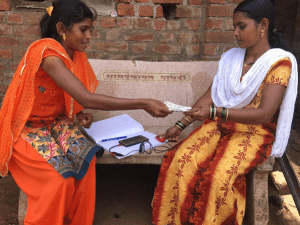 Figure 2: Anjali Tai offering financial services in Pathardi village near Jawhar (18 July 2019)
Figure 2: Anjali Tai offering financial services in Pathardi village near Jawhar (18 July 2019)
The eDost model incorporates door-step demand-based service delivery, an incentive mechanism, provision of value-added services and localised cash recycling.
GOOD PRACTICES
Selection and Onboarding Process
For streamlining the eDost model further, a standard plan for selection of villages, the criteria for selection of eDosts, and selection of a coordinator in each cluster for solving issues has been prepared. Also, a three-session onboarding plan has been prepared.
In the first session, the candidates are identified from remote villages which are in need of digital services and where financial support from sponsors is also possible. These candidates are invited for an orientation session and the do’s and don’ts for an eDost are explained. Further, a one-on-one interaction through virtual conferencing is carried out by a panel of team members. Based on the need assessment of candidates, their communication skills and their digital responsiveness, candidates are shortlisted for the second session. Most eDosts have completed 10th or 12th standards of schooling or sometimes are even graduates.
In the second session, we handhold the candidates for verification and registration procedures in collaboration with the FinTech partner. The fingerprint scanners are also handed over to the newly registered eDosts in the second session.
By the third session some eDosts would have already started offering digital financial services, while some eDosts may face some technical difficulties. These operational issues are sorted out in the third session. Also, eDosts can share among themselves the best practices which they have adopted to overcome similar challenges, so that it is mutually beneficial. As a next step, it is planned to expand the model in four blocks of Palghar district and other selected districts by the end of the year, and then across the country thereafter.
Adding new services
Even as scaling up is being continued, preparations for rolling out of other digital services beyond financial transactions is underway. This would be necessary to ensure that eDosts gradually proceed towards offering a host of digital services, so that it becomes a complete profession and help them earn better.
Considering that we select women who already have smartphone to become eDosts, the investments required are for the registration, fingerprint sensor and onboarding support. Taking into account the modest service fees received for offering financial services, the eDost can recover her registration fees by the end of the first or second month. However, to break even in terms of all costs involved, it probably takes about one or two years depending on how enterprising the eDost is.
Hand Holding to become an eDost Pro
Further, to offer eGovernance services at the grassroots level, it is planned that handholding support would be facilitated, so that some of the coordinators or eDost Pros could offer eGovernance services through a kiosk. In this kiosk, there would be a laptop/desktop, printer, other digital accessories, basic furniture, which would need additional financial support, while the rent for the kiosk would need to be borne by the eDost Pro.
The eDost Pro needs to be a graduate, proficient in terms of operating digital devices and conversant with different online applications. These eDost Pros will also handhold and mentor other eDosts (eDosts Lite) offering financial services in nearby villages. Hence, there would be two kinds of eDosts: eDost Lites who would mostly offer smartphone based services; and eDost Pros who would have laptops, printers, etc., and offer advanced digital services, in addition to playing a coordination role in a cluster of about 10 eDost Lites.
eDosts as knowledge intermediaries
It is also planned to deliver through the eDosts, various ‘Knowledge Dissemination Services’ using digital audio-visual media on ‘do-how’ topics, which will promote adoption by rural women of simple technologies and practices pertaining to agriculture, sanitation, waste management, nutrition etc., to improve the awareness, knowledge and skills of rural women. This can be done by the eDost through Self Help Groups or village meetings using her own mobile or a Pico-projector through an easily accessible mobile application. BAIF with its years of experience in livestock development, tree-based farming and natural resources management has already developed eLearning modules and has its own Learning Management System (LMS), and is in the process of developing it as a dedicated vertical. BAIF is also collaborating with several research and facilitating agencies for the same.
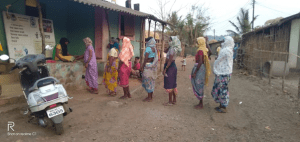 Figure 3: Ms Anjali Vazare delivering her services to an increased customer base during the lockdown in Pathardi on 15 April 2020
Figure 3: Ms Anjali Vazare delivering her services to an increased customer base during the lockdown in Pathardi on 15 April 2020
CHALLENGES
Initially we faced the following challenges:
1. Difficulty in collecting Know Your Customer (KYC) documents from villagers;
2. Moderate telecom network for internet service resulting in registration glitches; and
3. Restricted mobility to nearby towns due to COVID-19.
However, the Direct Benefit Transfer (DBT) of financial relief package to bank accounts of people from government during COVID-19 , created a compulsive demand for the villagers to access the digital financial service. In spite of potential health risks, this motivated many rural youth/women, like Anjali Tai, to earn their livelihood by providing financial and other necessary digital services, such as eDost.
BENEFIT AND IMPACT
So far around 10 eDosts have been actively performing amidst several constraints, including network fluctuations, social distancing constraints, harsh climatic conditions, etc., indicating that they are resourceful not only during normal everyday life but also amidst a crisis such as COVID-19. eDost is thus providing employment opportunities for educated rural youth (women) in their own locality and thereby providing a range of digital services to villagers at their doorstep.
SCALING UP
Based on this response, a scale-up programme for 15 eDosts was undertaken with support from funders at Jawhar around the beginning of 2020, after registering a distributor in Jawhar (Figure 3). These eDosts are from various remote villages around Jawhar wherein the ecosystem is supported by CSR sponsors such as Tata Motors Limited, Hinduja Foundation, ASK Foundation, Panasonic, etc. Further, a similar exercise was carried out with a target of enabling five more eDosts in Nandurbar district of Maharashtra in early March 2020.
The onboarding process consists of registration with the FinTech partner and purchase of fingerprint sensor with the connector. eDosts contribute to their registration process which is less than ₹1000, while financial support for associated hardware such as fingerprint scanners (which costs about ₹3000) is usually undertaken by project sponsors. All the facilitation support offered by BAIF, including candidate selection, training, post-training support and promotion, costs about ₹15,000 per candidate.
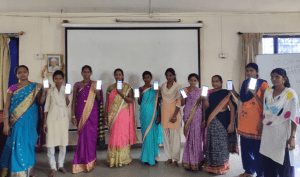 Figure 3: The eDost community at Jawhar after onboarding (11 February 2020)
Figure 3: The eDost community at Jawhar after onboarding (11 February 2020)
LESSONS LEARNED
The eDost women-first digital village catalyst model is a proof-of-concept for remote tribal areas wherein there is a dearth of digital services. It offers huge scope for replication across several developing countries. We will be reviewing and updating the good practices developed as part of streamlining the processes behind eDost for continuous learning and wider sharing. Even as we expand our portfolio of digital services, we need to work on several ICT-enabled verticals, such as eLearning, digital field data management and so on. The availability of mobile network services even in remote villages is an ingenious lifeline, which we need to make the best use of. We would like to call upon institutions belonging both to the government as well as the corporate sector to join us in this endeavour.
 Mr Ramprasad V is Programme Manager, BAIF Institute for Sustainable Livelihoods and Development (BISLD), Pune, Maharashtra, India (ramprasadv@baif.org.in)
Mr Ramprasad V is Programme Manager, BAIF Institute for Sustainable Livelihoods and Development (BISLD), Pune, Maharashtra, India (ramprasadv@baif.org.in)
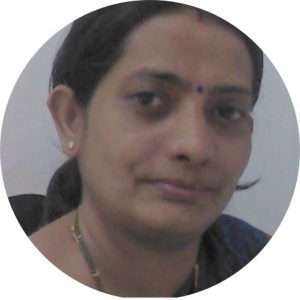 Ms Pooja Majgankar is Associate Programme Manager, BAIF Institute for Sustainable Livelihoods and Development (BISLD), Pune, Maharashtra, India (poojam@baif.org.in)
Ms Pooja Majgankar is Associate Programme Manager, BAIF Institute for Sustainable Livelihoods and Development (BISLD), Pune, Maharashtra, India (poojam@baif.org.in)

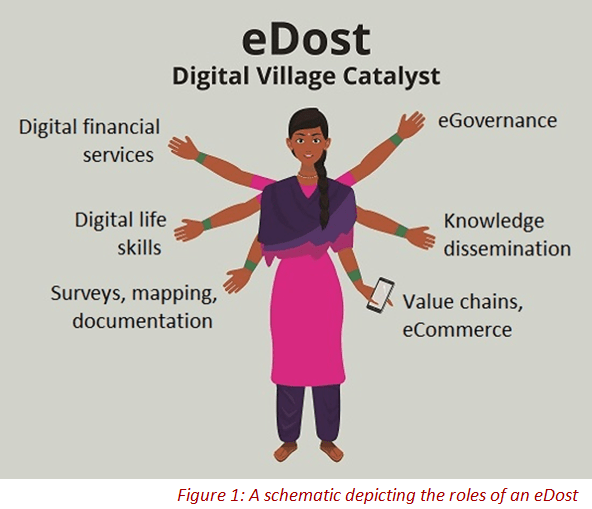
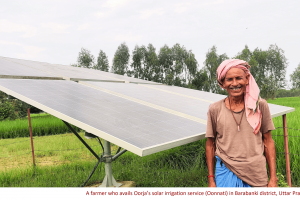
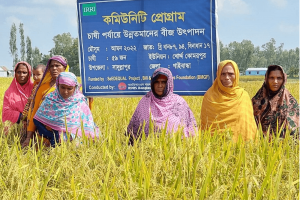
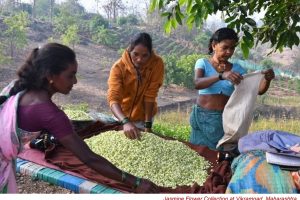
Yet another great initiative! eDost is a Departmental window of most essential rural development services to the needy by by our women warriors who remained behind scene all these years contributing to rural development silently. The components of eDost as demonstrated by BAIF are really practical and highly beneficial. The initiative along with scaling up efforts by BAIP, an institution of innovations for rural development is highly laudable. Congratulations to authors for the good work and excellent write up!